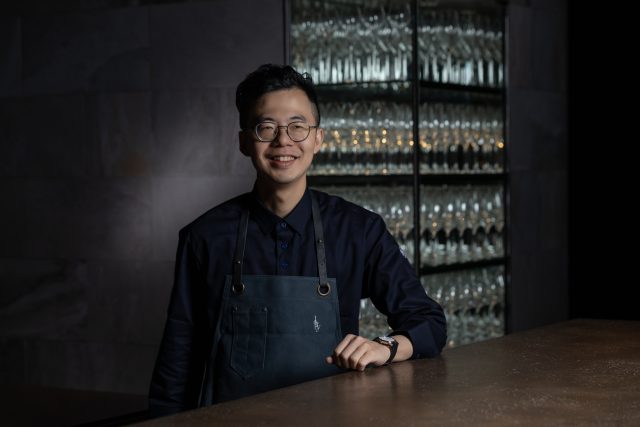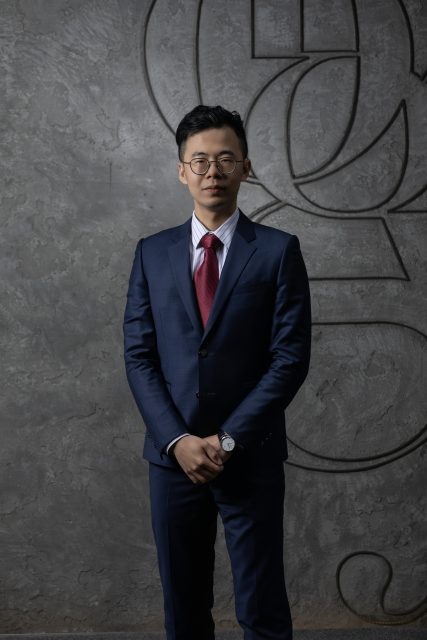Q&A: Taiwan’s first and only Master Sommelier
Leona De Pasquale speaks to Kevin Lu MS about his remarkable rise to become Taiwan’s first and only Master Sommelier and his insights into the future of the Taiwanese wine industry.

Kevin Lu’s journey to achieving the Master Sommelier title is as complex and captivating as the wines he admires. Hailing from Taiwan, an island where whisky and beer overshadow wine culture, Lu’s journey began with an epiphany while at university, courtesy of a glass of Cheval Blanc 1982.
Fast forward 15 years, and Lu, now the Chef Sommelier at Taipei’s two-Michelin-starred Logy, has shattered records, becoming Taiwan’s first — and Asia’s third — Master Sommelier this year.
“Growing up in a whisky-loving family and among beer-drinking mates, it’s a wonder I found my way to wine,” Lu says with a laugh. But once he did, there was no looking back. Armed with a burgeoning curiosity, he poured his hard-earned money from part-time jobs into wine tastings and devoured the books of Lin Yusen, Taiwan’s foremost wine expert.
After obtaining a degree in finance and completing Taiwan’s mandatory military service, Lu turned his passion into a career. Moving to Singapore, he worked his way up from commis to sommelier by 2017 at the Unlisted Collection group, immersing himself in the intricacies of wine service. It was during this time that the idea of pursuing the prestigious Master Sommelier qualification first took root.
Lu’s ambition was clear from the start, and eschewing the incremental path of other certifications, he set his sights firmly on the ultimate prize.
“With so many wine qualifications out there, I thought, why not aim straight for the top?” he recalls.
In 2019, Lu’s ambitions took him to Hong Kong, where he refined his craft under the mentorship of Arnaud Bardary MS at Black Sheep Restaurants. Immersed in a cosmopolitan setting, Lu honed his palate and deepened his determination, gaining exposure to an array of global wines. The pandemic brought him back to Taiwan, where he utilised his expertise as a wine consultant before joining Logy in 2022.
Two years later, Lu achieved his dream, becoming a Master Sommelier after a gruelling examination process. His triumph is not just a personal milestone but a cultural one, placing Taiwan on the global wine map.
What was the biggest challenge you faced as a Taiwanese individual growing up in a non-wine-producing country when learning about wine, and how did you overcome it?
“The biggest challenge, in my view, was accessing the international wines that were gaining popularity abroad but were not readily available in Taiwan. Taiwan’s small sommelier community also made it more difficult to engage with a broad range of perspectives.
“However, Taiwan’s lack of a domestic wine industry presented a unique advantage. In wine-producing countries, there is often a bias towards local wines and limited exposure to those from other regions. By contrast, Taiwan offers a wider variety of international wines, albeit with less depth compared to countries with long-established wine traditions. This diversity can be both an opportunity and a challenge for sommeliers looking to broaden and deepen their expertise.
“My experience working abroad, within larger wine communities, provided me with greater exposure to diverse viewpoints, which was invaluable.”
Since there is a less established wine culture in Taiwan, do Taiwanese wine students face a disadvantage when it comes to tasting?
“Not really. It’s more a matter of fine-tuning, or calibrating, our tasting abilities. Once you grasp the technical elements — like understanding why one wine is more acidic than another — it becomes much easier to catch up. It’s not as complex as some might think. With the right exposure and knowledge, anyone can develop a refined palate, regardless of where they’re from. It’s all about learning the nuances and applying that understanding consistently.”
What do you think are the key personality traits of a good sommelier?
“Curiosity and humility are essential. The world of wine is ever-evolving, and there’s always something new to learn. Curiosity has always driven me, particularly when developing innovative wine pairings. Humility ensures you remain open to new perspectives and willing to expand your knowledge, no matter how experienced you are.”
Partner Content
You spent a decade working towards the Master Sommelier title, with the final three years dedicated to preparing for the MS exam itself. What were the biggest challenges?
“The Master Sommelier exam is an exclusive, invitation-only process with a strict three-year timeframe to complete all components. If you don’t pass within that period, you must start from scratch. The exam is notoriously challenging, comprising theory, practical, and blind tastings, with a minimum pass mark of 75%, which creates immense pressure.
“For years, it felt like I was in a relentless cycle of preparing for the next exam. In the first year, I passed one section; in the second, nothing. But in the third year, despite the added challenge of having a newborn at home, I managed to pass two parts in one go. With little time to prepare, I adopted a more relaxed mindset, thinking, ‘just go for it’. Ironically, it was this shift in mentality that ultimately helped me succeed.”
What’s your advice for anyone preparing for the Master Sommelier exam?
“Don’t give up. Keep reading, practising daily, and taking breaks when needed to stay motivated. The process can feel overwhelming, but perseverance is key — if you stay the course you’ll get there. Even after passing the exam, I’ve continued the reading habits to keep refining my knowledge.”

What effect do you think your achievement will have on Taiwan’s younger generation?
“I hope it encourages others. If they see someone like me, who has been working as a sommelier for years, now receiving this recognition, it may inspire them to pursue a career in wine.”
What are the challenges for Taiwan in cultivating the next generation of sommeliers?
“The enthusiasm for wine is certainly evident, particularly among those already working in hospitality or the wine sector. However, a major challenge facing hospitality schools in Taiwan is that many graduates are reluctant to remain in the industry. This is due to low pay and unsociable hours, which deter students from pursuing long-term careers in the field. As a result, many lack the motivation to continue in the industry after graduation.”
Now that you’re Taiwan’s first Master Sommelier, how do you feel?
“I hope my achievement serves as a stepping stone for others. By demonstrating that it’s not a mission impossible, I aim to encourage those who follow in my footsteps. My hope is that more Taiwanese sommeliers will soon achieve similar recognition.”
After working in restaurants abroad for several years, what was the biggest cultural shock when you first returning to Taiwan’s hospitality scene?
“In Taiwan, the cultural tendency towards reserve means customers are less likely to approach sommeliers for wine recommendations. Even if they recognise a particular wine region, they often hesitate to ask about specific wineries or seek the sommelier’s insight into why a particular wine from that region was selected. This contrasts sharply with my experiences in Singapore and Hong Kong, where diners were far more proactive, engaging in discussions with sommeliers and showing a genuine interest in learning. The difference in approach is striking—in those cities, people are more inclined to interact and draw on the sommelier’s expertise.
“At Logy, however, our emphasis on wine pairings fosters greater interaction. Guests are naturally curious about the pairings we suggest, which encourages more engagement. That said, when customers independently choose a bottle, they tend to stick to familiar options and ask fewer questions.”
Is there a particular type of wine that currently excites you?
“My preferences are always shifting, but I do keep an eye on current trends abroad and incorporate them into my pairings. For example, natural wines are quite popular in Taiwan, while rosé wines struggle to gain traction here, despite their popularity overseas. I find rosé very versatile, especially with Asian cuisine. Orange wines also pair well with food and have a dedicated following, largely influenced by Japanese trends, which are closely tied to Taiwan’s wine scene.”
Do you have a positive outlook on the future of Taiwanese wine?
“Taiwanese wine has great potential. The terroir and altitude here are ideal for producing quality wines, much like Argentina, where altitude plays a big role in achieving the right day/night temperature difference. I believe Taiwan has the potential to follow a similar path.”
Are Taiwanese wines competitive in terms of quality and price, especially in high-end restaurants?
“It’s a complex issue. Taiwanese wines span a wide price range, from around NT$200 (£5) to NT$2,000-3,000 (£50 to £70), so there can be significant variation. Some, like Weightstone Winery, offer great quality but struggle with pricing that isn’t very accessible.
“The true potential of Taiwanese wines, however, will take time to unfold; it’s not something that will become apparent in just a few years. The first generation often faces criticism, but it’s the second and third generations that are likely to reap the rewards. Wine is an agricultural product, and it takes multiple generations to truly flourish.”
Related news
Strong peak trading to boost Naked Wines' year profitability




